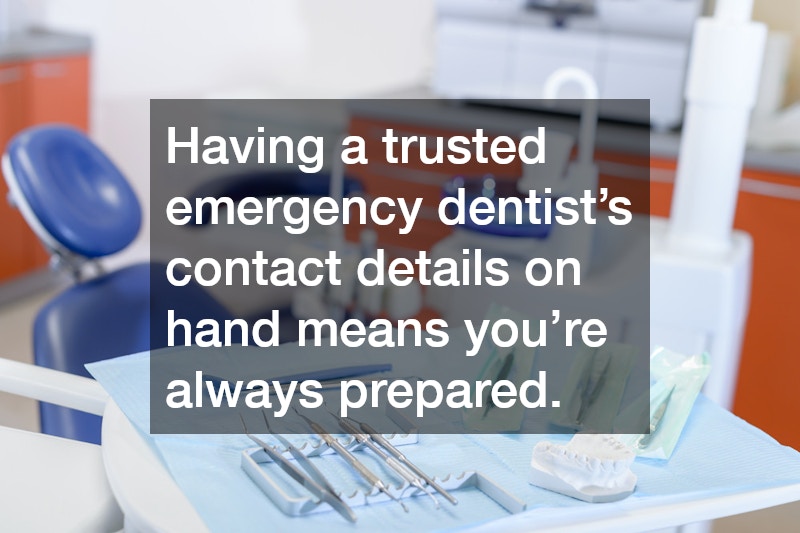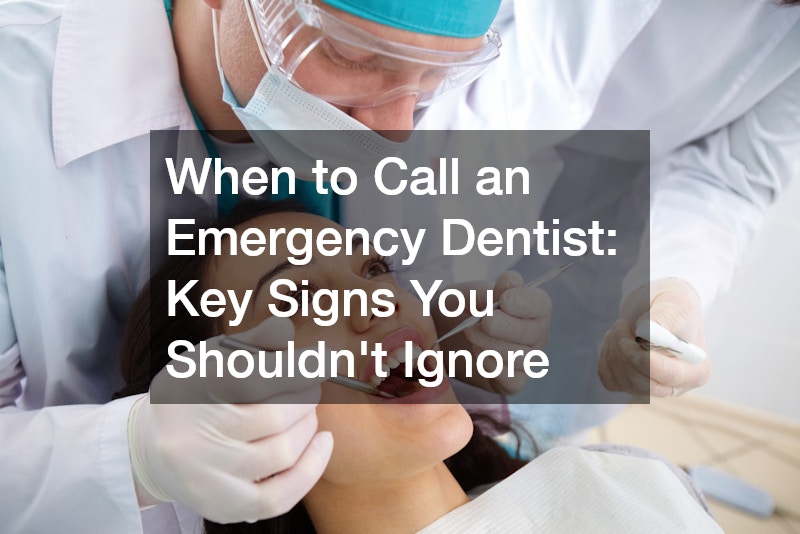When to Call an Emergency Dentist Key Signs You Shouldnt Ignore
An unexpected dental issue can quickly turn from a minor discomfort into a serious health concern. Knowing when to contact an emergency dentist can prevent long-term damage, reduce pain and avoid costly procedures later. Many people try to push through dental discomfort or delay treatment, but some situations require immediate professional care.
Understanding the signs that indicate a true dental emergency can help you take the right action at the right time, preserving your oral health and overall well-being.
Severe or Persistent Tooth Pain
One of the most common reasons to contact an emergency dentist is intense or lingering tooth pain. While occasional sensitivity might not need urgent care, pain that worsens or persists for more than a day often signals a deeper problem. It could indicate an infection, an abscess, a fractured tooth or significant decay.
Ignoring tooth pain increases the risk of complications, such as the infection spreading to nearby tissues or even the bloodstream. If over-the-counter pain relief does not ease the discomfort, or if the pain comes with swelling or fever, call an emergency dentist as soon as possible.
A Knocked-Out or Loose Tooth
Accidents during sport, falls or even biting into something hard can result in a tooth being knocked out or loosened. In such cases, time is critical. If you can reach an emergency dentist within 30 to 60 minutes, there is a much better chance the tooth can be successfully reinserted and saved.
If your tooth is knocked out, pick it up by the crown (not the root), rinse it gently with water if dirty and try to place it back in the socket. If that’s not possible, store it in milk or saliva and head to a dental clinic immediately. A loose tooth, even without pain, should also be evaluated straight away to prevent permanent damage.
Broken, Cracked or Chipped Teeth
While minor chips in teeth may be managed with a scheduled dental appointment, more severe breaks or cracks require immediate attention. A broken tooth can expose the nerves or pulp inside the tooth, leading to pain, infection or further structural damage.
Cracked teeth may not always be visible, but they can cause sharp pain when chewing or sensitivity to hot and cold. An emergency dentist will assess the severity of the crack and recommend the appropriate treatment, whether it’s a filling, crown or root canal.
Waiting too long can lead to complete tooth loss or infection, so don’t delay if you suspect a significant break or crack.
Swelling in the Mouth or Jaw
Facial or jaw swelling can signal a serious issue, especially if accompanied by pain, fever or difficulty swallowing. Swelling may result from an infected tooth, an abscess or an impacted wisdom tooth.
An emergency dentist will identify the cause and provide prompt treatment, which might involve draining the infection, prescribing antibiotics or performing an extraction. Left untreated, swelling caused by dental infections can spread rapidly, creating a medical emergency that goes beyond oral health.
If swelling interferes with breathing or swallowing, seek immediate hospital care.
Lost Fillings, Crowns or Restorations
Losing a dental filling or crown might not seem urgent, but it can leave a tooth vulnerable to damage or infection. Exposed nerves can cause discomfort and make it difficult to eat or drink.
An emergency dentist can restore the tooth with a temporary or permanent solution to prevent further complications. Until you reach the clinic, avoid chewing on that side of the mouth and keep the area as clean as possible.
If you still have the crown or filling, bring it with you to the appointment, as it may be reusable.
Bleeding Gums or Soft Tissue Injuries
Bleeding gums can be a sign of gum disease or injury. While mild bleeding during brushing might not need emergency care, spontaneous or excessive bleeding should be checked immediately. Likewise, cuts or lacerations to the lips, tongue or inside of the cheeks can become infected if not treated quickly.
If the bleeding doesn’t stop after 10 minutes of applying pressure or if the injury affects your ability to speak or eat, contact an emergency dentist. Prompt care reduces the risk of infection and helps the wound heal properly.
Knowing when to call an emergency dentist is crucial for maintaining not just oral health but overall health and comfort. Issues like intense tooth pain, knocked-out teeth, swelling, broken restorations and uncontrolled bleeding should never be ignored.
Emergency dental services are designed to address these urgent problems quickly and effectively, often saving the tooth and preventing complications. If in doubt, it is always better to consult a dental professional rather than waiting and risking further harm.
By acting quickly and seeking the right help when these signs appear, you protect your teeth, reduce discomfort and avoid more extensive treatments in the future. Having a trusted emergency dentist’s contact details on hand means you’re always prepared when the unexpected happens.


Post Comment